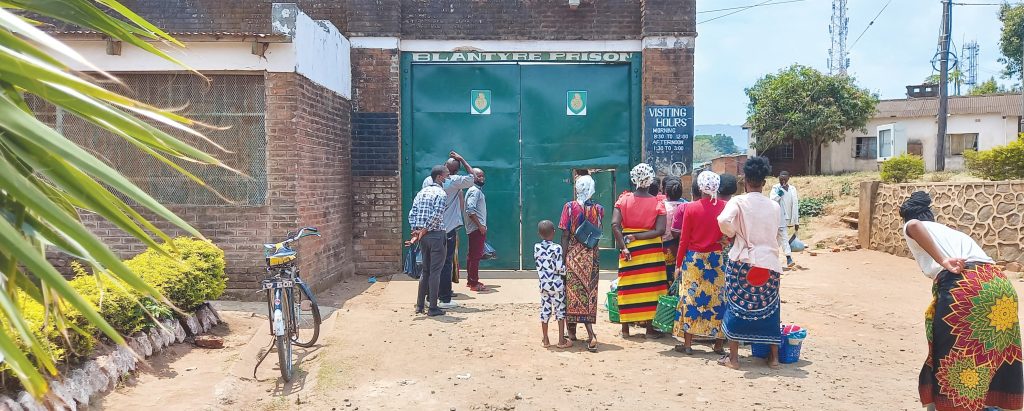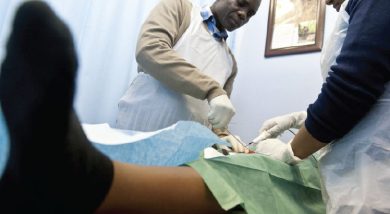Mothers struggle behind prison walls
Today, Funny Black, 18, is spending Mother’s Day within the confines of Blantyre Prison.
This young mother, with a one year and eight-month-old toddler, is on remand awaiting trial for an alleged murder.

Funny, a Form Three dropout from Thekerani in Thyolo District, is behind prison walls with her child.
With no one to care for her child outside of prison, she is left with no choice but to raise her child while incarcerated.
Funny recounts her journey: “When schools closed due to Covid-19, I decided to go to town to look for piecework.
“Unfortunately, during my quest for employment, I met a 27-year-old man who impregnated me.
“We began cohabiting at BCA Hills in Blantyre. Our relationship had its ups and downs. We would occasionally have disagreements, but sometimes we were fine.”
As time passed, Funny claims that the disagreements grew more frequent, and at one point, her husband broke her tooth.
She hesitated to leave, hoping for a change, but the situation did not improve.
The fights escalated, leading to a fierce fight in February 2022, during which Funny’s husband beat her severely, resulting in the loss of another tooth.
In self-defence, she grabbed a knife and stabbed her husband in the chest.
Tragically, her husband succumbed to the injuries, leading to Funny’s arrest for alleged murder.
She was just 17 years old at the time and has since been on remand at Blantyre Prison awaiting trial.
Tears stream down Funny’s face as she recalls the moment she entered Blantyre Prison.
She says: “We only receive one meal a day, consisting of nsima and cowpeas, cooked by male inmates.
“The nsima is often like porridge when we receive it, and we have to wait for it to harden. We wrap it in plastic along with the cowpeas to keep it warm and eat it later in the evening, even if it has gone bad.
“It’s heartbreaking, especially since my child has to grow up eating such an unbalanced diet.”
In addition to these challenges, persistent water shortages at Blantyre Prison are a constant source of concern for Funny.
The prison can go for three weeks without water, which compounds the problem during menstruation.
Funny explains: “To make matters worse, we lack access to sanitary pads. Three weeks without water means three weeks without bathing for both me and my child.”
According to her, selected inmates are allowed to fetch water from a stream just outside the prison, but she claims that the water is unhygienic and unsuitable for drinking or bathing.
Overcrowding is yet another issue. In a congested space, Funny has to prioritise her child for space, often sleeping in a sitting position to ensure her child sleeps comfortably.
Mefa Malata, 48, from Thekerani in Thyolo District, who is on remand for alleged murder, shares similar grievances.
She stands accused of murdering her former husband, who used to abuse her even after their marriage had ended.
Mefa recounts: “On one fateful day, my former husband came to my house drunk and attempted to harm me. I managed to escape and sought help from community policing members.
“When we returned, we found that my former husband had committed suicide by hanging. He was taken down by one of the community policing members.”
However, her former in-laws suspected foul play and set fire to all the houses in the compound.
A day later, police arrested her based on postmortem results indicating that her former husband had died due to head injuries, not strangulation. Since then, she has described her time on remand as “hell on earth.”
“We sleep in overcrowded spaces with poor ventilation, and we go for weeks without water. At times, there is even no food,” she says.
Apart from the living conditions inside prison, Mefa’s primary concern is her 20-year-old disabled daughter, who is not being properly cared for outside the prison.
Emily Mulima, 37, serving a 10-month sentence after being found guilty of theft while working in Chilomoni Fargo, shares her torment. Mulima, from Khombwe in Chileka, Blantyre, claims her innocence.
She laments that even access to healthcare services is a challenge at times.
Mulima explains, “When we fall ill, we have to inform the warders. However, they sometimes ignore our pleas, and we are taken to the prison health facility only when our conditions worsen.”
In addition to better food, she hopes that prison authorities will start providing sanitary pads to the female section of the prison, as it is a significant challenge.
Agnes Mponda, 24, who is on remand for alleged murder, shares similar sentiments.
Accused of allegedly murdering a man who had proposed love to her, she emphasizes the importance of sanitary pads, especially during prolonged water shortages in the prison.
Agnes says “Since we are not provided with sanitary pads, we resort to tearing up clothes and blankets, which we burn afterward.”
Agnes, a mother of two, highlights that the living conditions in prisons often make the inmates ill. She expects that these issues will be addressed soon.
In 2019, the Centre for Human Rights Education Advice and Assistance (Chreaa), with funding from Amplify Change, initiated a project to lobby for the inclusion of menstrual hygiene in the Malawi Prison Health Budget.
The organisation took this step after noting that many of the country’s female inmates could not afford sanitary pads.
The Malawi Prison Service reports that the country’s prisons, with a holding capacity of 5 000 prisoners, currently hold between 15 000 and 16 000 inmates, with female inmates constituting 1.1 percent of the population.
In 2020, a study titled ‘Prison Facilities Were Not Built With a Woman in Mind: An Exploratory Multi-Stakeholder Study on Women’s Situation in Malawi Prisons’ highlighted various challenges affecting female convicts.
The study revealed issues related to sanitation and hygiene, nutritional provision, access to healthcare services, and the needs of women and children in prison.
Luis Gadama, Chrissie Thakwalakwa, Chimwemwe Mula, Victor Mhango, Chikosa Banda, Stephanie Kewley, Alyson Hillis, and Marie-Claire Van Hout conducted this study.
Mhango, Chreaa’s executive director and a human rights advocate, emphasized the additional challenges faced by women when incarcerated with children.
He points out that the courts often fail to consider the best interests of the child, particularly when the mother has to go to prison. Mhango argues that children in prison with their mothers should receive special care, including special diets, recreation, education, and all basic necessities.
He further asserts that it is the State’s responsibility to ensure that these children are well-cared for when the mother has nobody to leave the child with. He concludes, “We can’t have children growing up in prison; it is inhumane.”
Malawi Prison Service spokesperson Chimwemwe Shaba briefly stated that they are doing everything possible to ensure the welfare of female inmates, especially those with children, is met.
Efforts are being made to address the overcrowding and sanitation issues in prisons.
However, the challenges faced by incarcerated mothers and their children are complex and multifaceted.
The conditions inside prisons often have far-reaching implications, not only for the inmates but also for their children who, through no fault of their own, find themselves growing up in this challenging environment.
Mhango’s advocacy highlights a critical issue in the penal system – the lack of a comprehensive approach to accommodate children who have to reside in prisons with their mothers.
While it is essential to ensure the safety and security of the society by incarcerating those who break the law, it’s equally vital to protect the rights and well-being of the children who, by circumstance, end up behind bars.
One must consider that many of these children may have been born in prison or brought into this environment at a very young age. Their formative years are spent within the confines of high walls and barbed wire. This not only affects their physical health due to limited access to adequate nutrition and healthcare but also has a profound impact on their emotional and psychological development.
A child’s early years are crucial for their growth and development. They need a nurturing and stimulating environment that supports their physical, emotional, and cognitive development. Incarceration, with its inherent limitations, cannot provide this environment.





